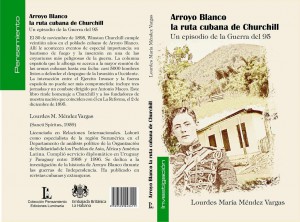21st March 2014 Havana, Cuba
When Winston Churchill went to war in Cuba
In a week when Russian aggression in Eastern Europe has brought back memories of the Cold War, it seems appropriate to write about Sir Winston Churchill, the great British statesman who coined the term ‘the iron curtain’. Churchill’s inspiring, determined, brilliant leadership during the Second World War is known to all. Less well-known are his links with Cuba.
Last Saturday in a small dusty village in the centre of Cuba, author and historian Lourdes María Méndez Vargas told the story of Churchill’s first visit to Cuba at the launch of her book – ‘Arroyo Blanco, Churchill’s Cuban Journey; an episode of the 1895 war’. Arroyo Blanco, a small village in the east of Sancti Spiritus province, was Churchill’s destination and base when he came to observe the Cuban Independence War. His journey there was, as you might expect given its location, fairly roundabout and lengthy. The story goes that Churchill, then a young officer in the 4th Hussars, was kicking his heels in London and decided he needed to see some action. The only war at the time was in Cuba so, once he’d got permission from the Spanish government in Madrid, he sailed to Havana, took a train to Cienfuegos, a boat to Tunas de Zaza and then another train to Sancti Spiritus where he joined the Spanish Army, under the leadership of General Suárez Valdés. They trekked to Arroyo Blanco where Churchill celebrated his 21st birthday on 30 November 1895. His birthday present was to come under gun fire for the first time in his life as the Spanish troops he was with came up against the Cuban forces, led by Máximo Gomez and Antonio Maceo. Churchill spent only a few weeks in Cuba on this first visit and left Havana on 14 December 1895.

In today’s Arroyo Blanco there’s little to tell you about Churchill’s visit and you’ll need Lourdes’ book to guide your way. The parish priest’s house, which Churchill apparently visited, is now the village museum. Centre-stage in the museum is an antique table, at which, according to village legend, Churchill once sat. An equally antique door is still in use in one of the colonial buildings; the holes through which people used to fire their guns as they hid inside are now filled in but still visible. And you can still see the pathway between hills which Churchill took along with the Spanish column as they walked off to war. Further afield, the train station at Tunas de Zaza is apparently much as it was when Churchill arrived there. And the Cuban countryside where battle took place hasn’t changed that much.
Churchill’s second visit to Cuba was after the Second World War when, no longer Prime Minister, he travelled across the Atlantic at US President Truman’s invitation. In Havana he stayed in the famous Hotel Nacional which still today has a Churchill Bar, named in his honour. After a short stay he travelled north and a few weeks later delivered the famous ‘Iron curtain’ speech in Fulton, Missouri, President Truman’s home state. I wonder whether it was over a glass of good Cuban rum in the small corner bar that today bears his name he drafted his opening words. And I suspect that, in the week that the Russian Federation illegally annexed the Crimea, much of what Churchill said in Fulton will still resonate amongst the citizens of Ukraine today.
The article does no mention the date that Churchill was in Havana. I believe it happened the first week of February, 1946 and that he was accompannied by his wife Clementine and daughter Sarah. Do know that when he visited Havana, he, his wife and daughter were invited, visited and spent a whole afternoon to the country farm of Cuba’s State Minister, José Miguel de la Campa and the Permanent Delegate of Cuba to the U.N., Guy Pérez-Cisneros Bonnel, whom he had met sometime before (Dec. 1945) in London at a lunch invitation of the Cuban Embassy in that City, by Cuban Ambassador Willy De Blanc. That meeting was two fold: An Agreement with the Romeo and Julieta Cigar representatives and Cuba’s Tobacco Commissioner.
Romeo Julieta cigar “Churchill” and with Cuba’s United Nations Preparatory Delegates that met latter at Westminster on Jan. 1946.
That meeting was in order to ask him for his assistance in the creation of a Human Rights commission at the U.N. In this caser, it was Cuban Delegates to the First Assembly at Westminster, Drs. Guy Perez-Cisneros, Ernesto Dihigo and Guillermo Belt who were advised by Churchill to lobby i/f/o Eleanor Roosevelt, who was one of the U.S. Delegates to the Westminster meeting a few days later.. Finnaly, on the advise of W.S.C. Cuba lobbied for the votes to nominate and eventually Mrs. Rossevelt was selected the following year as the Chairman of the Human Rights Commission, with was finnaly approved on Dec. 10, 1948 at Pallais de Chailot in Paris, France on Dec. 10, 1948.
The UK trreated people in colonies better than other countries duch as Belgium or Germany. Those colonies were left better and richer than before the British arrived. They were then made independent. Some like Zimbabwe have gone backwards since they ceased to be colonies.
THE NOT SO GREAT CHURCHILL TOLD US OF THE IRON CURTAIN,BUT HE DID NOT TELL US ABOUT THE POOR CONDITIONS OF THE PEOPLE ENGLAND HAD COLONIZED AROUND THE WORLD.
What a surprise! The great leader Churchill in Cuba! The final part of the text about Ukraine is really very interesting. I wonder how Ukraine will find the peace because every day the facts are more complicated.
Very interesting! Looking forward to reading it…